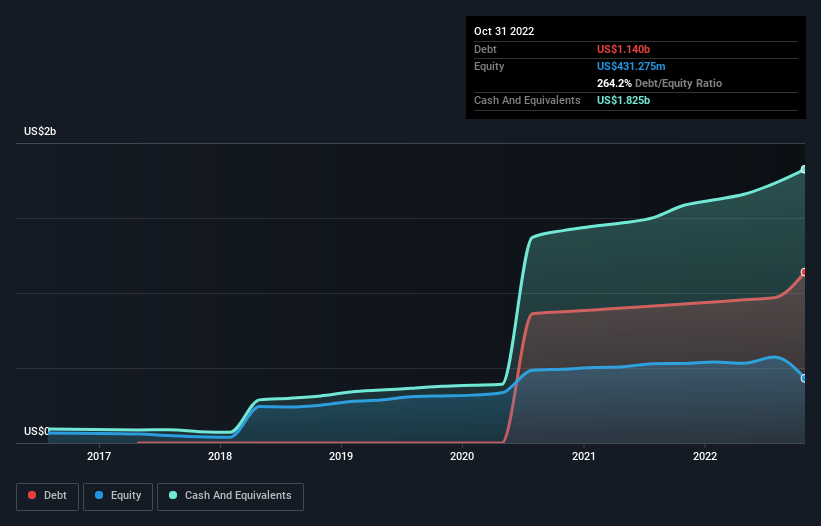
David Iben put it well when he said, 'Volatility is not a risk we care about. What we care about is avoiding the permanent loss of capital.' So it might be obvious that you need to consider debt, when you think about how risky any given stock is, because too much debt can sink a company. We can see that Zscaler, Inc. (NASDAQ:ZS) does use debt in its business. But is this debt a concern to shareholders?
What Risk Does Debt Bring?
Generally speaking, debt only becomes a real problem when a company can't easily pay it off, either by raising capital or with its own cash flow. In the worst case scenario, a company can go bankrupt if it cannot pay its creditors. However, a more frequent (but still costly) occurrence is where a company must issue shares at bargain-basement prices, permanently diluting shareholders, just to shore up its balance sheet. By replacing dilution, though, debt can be an extremely good tool for businesses that need capital to invest in growth at high rates of return. When we examine debt levels, we first consider both cash and debt levels, together.
See our latest analysis for Zscaler
How Much Debt Does Zscaler Carry?
The image below, which you can click on for greater detail, shows that at October 2022 Zscaler had debt of US$1.14b, up from US$927.0m in one year. However, it does have US$1.82b in cash offsetting this, leading to net cash of US$685.2m.

How Strong Is Zscaler's Balance Sheet?
The latest balance sheet data shows that Zscaler had liabilities of US$1.11b due within a year, and liabilities of US$1.29b falling due after that. Offsetting this, it had US$1.82b in cash and US$270.2m in receivables that were due within 12 months. So its liabilities total US$309.4m more than the combination of its cash and short-term receivables.
Of course, Zscaler has a titanic market capitalization of US$15.0b, so these liabilities are probably manageable. Having said that, it's clear that we should continue to monitor its balance sheet, lest it change for the worse. While it does have liabilities worth noting, Zscaler also has more cash than debt, so we're pretty confident it can manage its debt safely. When analysing debt levels, the balance sheet is the obvious place to start. But ultimately the future profitability of the business will decide if Zscaler can strengthen its balance sheet over time. So if you want to see what the professionals think, you might find this free report on analyst profit forecasts to be interesting.
In the last year Zscaler wasn't profitable at an EBIT level, but managed to grow its revenue by 60%, to US$1.2b. With any luck the company will be able to grow its way to profitability.
So How Risky Is Zscaler?
Although Zscaler had an earnings before interest and tax (EBIT) loss over the last twelve months, it generated positive free cash flow of US$244m. So taking that on face value, and considering the net cash situation, we don't think that the stock is too risky in the near term. One positive is that Zscaler is growing revenue apace, which makes it easier to sell a growth story and raise capital if need be. But that doesn't change our opinion that the stock is risky. The balance sheet is clearly the area to focus on when you are analysing debt. But ultimately, every company can contain risks that exist outside of the balance sheet. For example - Zscaler has 3 warning signs we think you should be aware of.
When all is said and done, sometimes its easier to focus on companies that don't even need debt. Readers can access a list of growth stocks with zero net debt 100% free, right now.
Valuation is complex, but we're here to simplify it.
Discover if Zscaler might be undervalued or overvalued with our detailed analysis, featuring fair value estimates, potential risks, dividends, insider trades, and its financial condition.
Access Free AnalysisHave feedback on this article? Concerned about the content? Get in touch with us directly. Alternatively, email editorial-team (at) simplywallst.com.
This article by Simply Wall St is general in nature. We provide commentary based on historical data and analyst forecasts only using an unbiased methodology and our articles are not intended to be financial advice. It does not constitute a recommendation to buy or sell any stock, and does not take account of your objectives, or your financial situation. We aim to bring you long-term focused analysis driven by fundamental data. Note that our analysis may not factor in the latest price-sensitive company announcements or qualitative material. Simply Wall St has no position in any stocks mentioned.
About NasdaqGS:ZS
High growth potential with excellent balance sheet.
Similar Companies
Market Insights
Community Narratives



